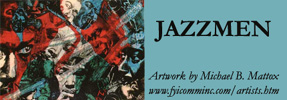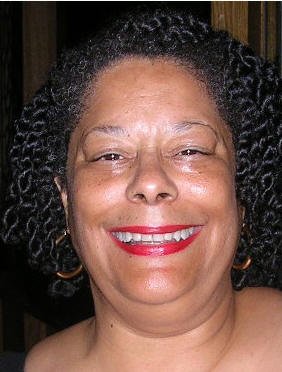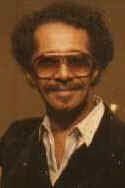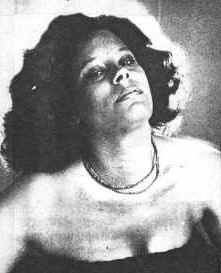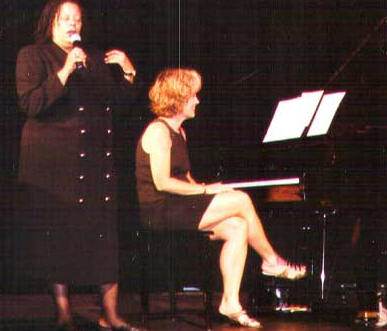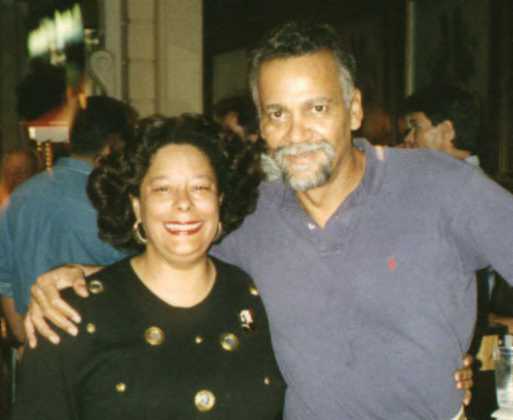|
|
Mickey Roker "I have practiced hard to be able to play with greats like Mickey Roker," said trumpet player John Swana. In 1932, Granville 'Mickey' Roker was born in Miami, Florida. His mother Willie Mae Roker shared a small house in a poor section of the city with her son and brother Walter James Bowe. Mr. Roker's father, Granville Roker Sr., never lived with them. "We came up so poor back then that it must've been God that got us by," said Mr. Roker.
In 1942, Mr. Roker's mother passed away. Mr. Roker's grandmother brought her fifteen year-old son and Mr. Roker to Philadelphia to live with relatives. "My Uncle Walter took care of me. He had to be the man and so he went to work at fifteen," said Mr. Roker. Mr. Bowe shared a love of jazz with his nephew. A long-gone Philadelphia radio had their ears. "Uncle Walter wanted to play himself, but he was so busy working," said Mr. Roker. A vicarious Mr. Bowe purchased the ten-year-old his first jazz records. A few months later, Mr. Bowe purchased a drum kit for the child. An early denizen of the clubs, the teenage Mr. Roker idolized Philly Joe Jones. The young man witnessed jazz in a Philadelphia that no longer exists. "People like Miles always used to come down to the Showboat," he continued. "And J.J. Johnson used to come down to Peps. And Clifford Brown and Dizzy used to come to the Music City clubs," remembers Mr. Roker. "Mickey's musical hero is Philly Joe Jones," said Ortlieb's Jazzhaus owner, Pete Souders. "But note the evolution. Where sensitivity and dynamics are concerned, Mickey has taken Philly Joe's example to an even higher level." In 1956, Mr. Roker married his wife Priscilla. They had two children, Ronald and Debra. "She was so beautiful, man. We came up together, me in west Philly, Priscilla in north Philly," said Mr. Roker. In 1957, Mr. Roker played a six-night engagement at the Peps Star Bar with Gloria Lynne and Jimmy Heath. He easily gained the attention of Lee Morgan, Clifford Brown and others. Bob Cranshaw met Mr. Roker in 1957. The drummer had been working in the Ray Bryant Band in Chicago. One night Arthur Harper, the bass player overslept. Mr. Cranshaw, ever watchful for an opening, presented himself. "Any time I came to Chicago, I would watch the gigs. If somebody were late, I was ready to play," said Mr. Cranshaw, a native of Evanston, Illinois.
The first thing which Mr. Cranshaw said he discovered about Mr. Roker was his sense of humor. "He kept me laughing," said Mr. Cranshaw, who sometimes used to crack up on stage, stimulated by a mere glance by Mr. Roker. In the 1961, the two played in the G.G. Gryce band in Chicago. Later that year, when Mr. Roker was playing in Mary Lou William's band at the Hickory House (around the corner from Birdland) in New York, Ms. Williams fired her bassist, Larry Gales. Again, Mr. Cranshaw came to bat. "Mickey is my best friend and we went wherever the other went," said Mr. Cranshaw. This time, Mr. Cranshaw was motivated to play with Mr. Roker as much as to follow any bandleader's star. "Mickey is tasty. He has a very good feel, understands dynamics and can build a tune," added Mr. Cranshaw. The pair had freelanced together in New York and Chicago since 1957. They were becoming an item. "Once we locked in, it was a love affair," said Mr. Roker. "We had an apartment together for two years in New York back in the sixties, and we were like a musical couple," said Mr. Cranshaw. "I think Mickey and Bob have a deep connection from years of playing together," said Mr. Swana. The pals bottomed Junior Mance's Trio in 1963, behind singer Joe Williams, playing Peps and Showboat routinely. Soon, they would collaborate on countless Blue Notes recordings. "The union of those two guys is unbeatable and unique and there has never been anything like it ever before or since," said pianist Mike LeDonne, a frequent collaborator with the duo. "They work together better than anybody and there are only a few who have ever reached a level like Bob and Mickey," said Mr. LeDonne, a Juilliard professor. Endless studio dates with Stanley Turrentine and others proved the greatness of the duo. Each player gave the other the foundational rhythm to prove he was master who avoided diverting cross rhythms and flashy broken time. Just straightforward jazz all over the thermometer. Mr. Roker and Mr. Cranshaw explain the simple recipe for this greatness. "We play swinging, bluesy phrases inside the melody. We've always avoided the avant-garde and kept to the mainstream," said Mr. Roker. "My thing is the feel. I am a swing bass player who plays time. There are melodic players and soloing bass players. I play the roots of the chord and set up the feel and round out the pocket," Mr. Cranshaw said. A collector searching for jazz tradition by going through racks of old albums may come across the 1962 album "Junior's Blues" by the Junior Mance Trio, totally dig the funky "Gravy Waltz," and then become thrilled that Mr. Cranshaw and Mr. Roker, both seventy-one are still playing together. "We might step outside a little bit but we don't really go out that far, because we want people to understand and enjoy," said Mr. Roker. Like Charlie Parker and Dizzy Gillespie, the Roker-Cranshaw machine became recognized as adroitly embodying the root of swing and the attack of bebop. "We just took simplicity and made it artistic," said Mr. Roker. A shining example of the convergence of these men and their friends, occurred in 1966 when they recorded, saxophonist Stanley Turrentine's "Rough 'n' Tumble," whose tunes were arranged by Mr. Pearson. It is a jazz-soul work, where you can hear the rhythm ignite especially on "Feeling Good." "I had a ball playing with Duke Pearson, who died young. I also had a ball playing with Stanley Turrentine who just left us," said Mr. Roker. His phone never stopped ringing. Dates with Mr. Morgan, Mr. Rollins, Bags, Shirley Scott followed. Although he does not believe that he is famous, he played with the best. He continued, "There were times when the groove was just so hard that on the second night before the first tune was played, I'd be smiling." Patrons of the Manhattan club Smoke witnessed Mr. Cranshaw and Mr. Roker play again in December, 2002 at the bassist's 70th birthday party, during which the duo played several tunes with pianist Harold Mabern. A semi-annual tribute to vibraphonist Milt Jackson still takes place at Ortlieb's.
"I've had so many good experiences that it's a pleasure just going to work at night," said Mr. Roker. Mr. Roker first went to New York in 1961. He had been selected to back up an alto sax player at the Village Vanguard and was supposed to play several engagements. After playing the first night, he arrived the next evening but found that a different drum kit was occupying the stage. "Man, why didn't somebody call me?" Mr. Roker remembers complaining. "I mean I came up here on a train full of people thinking I'm going to work and the least you could do was tell me about the switch." Max Gordon, the club's owner informed Mr. Roker that the alto sax player did not like how Mr. Roker had played. "But I didn't call them for the gig. They called me for the gig," Mr. Roker recalls, then laughs. He says he can't remember the name of the alto saxophonist. Mr. Roker was introduced to Blue Note Records through A&R Studios by head arranger Mr. Pearson, who had been rehearsing with Mr. Cranshaw and the percussionist at the latter's home. "Back in those days, there were a lot of soloists, but they didn't always come with a rhythm section," said Mr. Roker. At Blue Note in the 1960's, "stock rhythm" meant bassists and drummers such as Ron Carter, Joe Chambers and Billy Higgins. Mr. Roker was a shoe-in. "Herbie Hancock and Hank Jones were probably the first big names to call me," said Mr. Roker. For anybody familiar with the career of Dizzy Gillespie, there is hardly a 1970's live album or concert footage which does not feature Mr. Roker behind the kit. While Mr. Cranshaw was forging a career-long collaboration with Mr. Rollins, Mr. Roker gave Mr. Gillespie his live rhythmic legs. "Dizzy was such a great musician that it was like going to school," said Mr. Roker. He recalls gigs such as the Montreaux Jazz Festival in 1975. "Dizzy would give you something to handle but you didn't hear it. You wouldn't even realize what was going on until two or three years later when you heard the recording," said Mr. Roker. Listening to the recordings, you hear the drummer following everything with precision, putting his beat squarely in the middle of every change. "If Mickey is challenged, it's just amazing what comes out," said Mr. Souders. Mr. Roker mentioned that he once caught wind of a compliment that Mr. Gillespie paid him. "While you are playing with Mickey, you can go to China and come back and the time will still be the same as when you left," said Mr. Roker, paraphrasing Mr. Gillespie's compliment. If you visit Ortliebs, you witness that the players are always cracking up between songs. Mr. Souders can be caught steeling a glance at Mr. Roker, watching for his reaction and expecting a humorous comment. These men don't take life very seriously. The listener feels lucky. "Out of everybody I know--- musicians or not, Mickey is one of the greatest gentlemen," said Mr. Souders. For instance, the club owner explained that his business office of Ortlieb's is a tiny cubbyhole containing his computer and two feet of walking space. Mr. Roker, he says, has never once asked to leave his musical instruments in there since joining the club in 1987. "Mickey is a completely giving person," continues Mr. Souders. "He supports every situation on and off the bandstand, more than one hundred percent." Players insist that Mr. Roker's uplifting attitude is the humble power behind the music. When it comes to initiating a song's changes, it is evident that Mr. Roker takes his role as an accompanist very seriously. "I'm still trying to learn how to play," he says. During a Frederick Lowe tune, the band lays out, except for Mr. Roker who varies the roll on his snare and ignites his toms. It is combustible material that has been longing to explode. A solo erupts. Mr. Souders shrugs that his famous employee doesn't believe in himself as a soloist. "But when he takes his solo, Mickey is better than anybody I know," swears Mr. Souders. "Man, musical talent is a gift from God," starts Mr. Roker, "Of, course, you got to swing, because that's spiritual." He explains that belief in God is the root of the tree of music. Without the root, the tree falls over. "It's like going to school," Mr. Souders remembers pianist Uri Caine telling him, "I got to play with Mickey Roker every night." Technically, Mr. Roker is an employee of Mr. Souders. It is hard to listen to their music without wondering why there is no admission charged during weeknights. Is Mr. Roker doing so well on album residuals that Mr. Souders is running away with a great deal? "Before man played for money, he made better bands, because man put God before everything else," said Mr. Roker. Portraying the perfect example of a place where the music comes first, Ortlieb's has a very narrow interior and a tiny stage. The building, whose façade resembles a tool shed, is surrounded by construction projects busily converting the ruins of the Ortlieb's and Schmidt's breweries into commercial real estate. "Although Mickey now goes to church a lot, he used to say that Ortliebs was his church," laughs Mr. Souders. Mr. Souders, a saxophonist, admits starting the club because he wanted a place to play. "When the club first opened in 1987, Pete had a couple of other musicians working there. But I was still playing on the road," remembers Mr. Roker.
Shirley Scott came to Ortlieb's with drummer Bobbie Durham to inaugurate the opening. In November, Mr. Durham, who had been playing continuously with Oscar Peterson, joined Mr. Peterson and Ella Fitzgerald for additional road gigs. Ms. Scott, telephoned Mr. Roker, who was still on the road. Mr. Roker had met Ms. Scott years before in New York. The two native Philadelphians remained friendly. Mr. Roker had wrapped up the seventies by recording with Count Basie and Ms. Fitzgerald on, "A Perfect Match." He had spent worked the eighties both on the road and the studios with the Modern Jazz Quartet and the bands of such stars as Mr. Peterson, Ray Bryant, Jackson Brown, Ray Brown and Zoot Sims. While Mr. Roker cleared space on his plate for Ortlieb's, drummer Al Jackson kept the skins warm. Benny Nelson covered the bass position until Arthur Harper solidified Ms. Scott's organ trio. "The Ortlieb's thing just clicked and we took off," said Mr. Roker. The format forged by the trio quickly brought fame to the club, whose legacy was further ennobled because the building was becoming a public curiosity. Ortlieb's Brewery had run the bar as an adjunct to its operation since 1905. Along with the brewery building, Poor Henry's Brewpub--- Ortlieb's old bottling plant next door, was razed. The twelve-acre Schmidt's plant around the corner on Poplar Street was also demolished. The buildings were denied landmark status. There grew a metaphor which Ortlieb's alone could claim, having to do with the demise of jazz clubs and Philadelphia industry alike: while history died in Philly, Ortlieb's survived. People fell in love with the club and bragged that they had been there. "I once drove Duane Eubanks to a gig at Ortlieb's," remembers New York saxophonist John Gordon, winner of the 1996 Thelonius Monk Award for saxophone-playing. The Philadelphia musicians swooned that Mr. Roker was back home. They met a generous master who was interested in playing with them. "Man, at first, I didn't think Mickey was going to give me the time," remembers a glad Bootsie Barnes. Just before Mr. Barnes met Mr. Roker, the former had recently been playing many Philly gigs with a slew of different drummers. One day during the late-eighties, Richard "Buzzy" Wilson, the late promoter of Zanzibar Blue, decided to pair Mr. Barnes and Mr. Roker on a gig at the Second Office on Juniper Street--- a tiny club so-named because it was a visited by Center City office workers after five-thirty. "Buzzy, man, he ain't gonna make no gig with me," Mr. Barnes said he told Mr. Wilson. "Yeah, he'll make a gig with you," replied a confident Mr. Wilson, according to Mr. Barnes. When Mr. Barnes arrived at the Second Office, Mr. Roker was already there with his drums assembled. "Mickey was on the gig before I got there with the drums all set up. Real professional," said Mr. Barnes. The sixty-five year-old Mr. Barnes was born in the University of Pennsylvania Hospital. His family originally lived in South Philly and then moved to the Richard Allen projects, in the north part of the city. His first gig was at Max's Bar on Girard Avenue as a drummer at thirteen. The managers gave him a Coke and allowed him to play as long as he stayed away from the bar. Dubbed the "Philadelphia Prime Minister of the Tenor Saxophone," by his friends, Mr. Barnes performed in episode 41 of "The Cosby Show" with associates Art Blakey, Jimmy Heath, Tommy Flannagan, Joseph B. Wilder, Percy Heath, Jimmy "Badman" Oliver, Tito Puente, Carlos "Patato" Valdias and Eric Gale. Bill Cosby grew up in the Northern Liberties neighborhood in which Ortlieb's is located. Mr. Barnes remembers that his childhood friend Mr. Cosby had tried to get a busy Mr. Roker to perform on the episode.
"No, don't get me Mickey Roker, he's gonna steal my drums," Mr. Barnes remembers Mr. Cosby saying. Mr. Roker-- therein joked Mr. Cosby, would pilfer the star's spotlight; Mr. Cosby, born in Germantown, was a drummer back in the day. After 1990, Ortlieb's held onto its star line-up for as long as it could. In the early 1990's, Ms. Scott's teaching job at Cheney University knocked Tuesday out of her schedule. "So, we turned Tuesdays into a jam session and worked only four nights," said Mr. Roker Mr. Roker's schedule then subtracted Wednesday nights. "It was getting too much for me to play live constantly after ten years," explains Mr. Roker. Mr. Souders and Mr. Roker decided to fill up the schedule with younger players. Mr. Barnes would cover Wednesday nights with his organ trio. Sundays would be filled with Roger Prieto's Quartet. "What keeps the music alive is the young guys," said Mr. Roker. "One of my first Philadelphia gigs was at Ortlieb's in the early nineties, playing with vocalist Shirley Scott, bassist Arthur Harper and Mr. Roker," said Eric Alexander, "and when you are playing with Mickey, you are playing with jazz history and the very best." Mr. Roker bottomed every act visiting the stage, smoothly backing the traditional bob-swing of Larry McKenna and the avant-garde slant of Archie Shepp. "If a real hot shot comes in, like Eric Alexander, Ralph Bowen--- or earlier on, Al Gray, showing off their advanced Coltrane changes or motifs from some distant jazz subcategory, Mickey plays right to that," said Mr. Souders. Several musicians have mentioned that Mr. Roker purposely bumps into a player at Ortlieb's bar while he's walking by, just to disarm. Mr. McKenna says that Mickey goes out of his way to make people feel special. "He'll say he's so glad that it's me playing at Ortlieb's tonight," said Mr. McKenna. "When I hear Mickey say that, it makes me want to play." "To me he¹s family. He¹s funny as hell and he's got an inner warmth that makes everyone around him feel better. I'm glad he's here," said pianist LeDonne. "There is also a lot a humor in his playing," said Mr. McKenna about the transcendent style of Mr. Roker. "When we're having fun, we just play the melodies from a lot of standards and vary them like Bird and Dizzy, which means taking almost nothing and making something out of it," said Mr. Roker. On a Thursday in February, Mr. Roker joined Mr. Souders in a lexicon of Cole Porter, Gershwin and Lowe, Rodgers, Hart and Hammerstein numbers. The diners at the club became relaxed, watching the stage intensely. They looked at one another smiling every time a familiar melody jumped out of the arrangement. Chris' Jazz Café regular, Jimmy Bruno says, "Mickey is one of the last of the great jazz drummers in the tradition that people now date as 'classical' or 'traditional bebop-swing'." During the second set, a tenor saxophone player--- easily four decades Mr. Roker's junior, was allowed to replace Mr. Souders on the stage. The young man seemed nervous to start, his fingers aiming and brushing his keys. Mr. Roker, before the music began, beckoned the younger man to lean toward the drums. Rare to witness these days, Mr. Roker's informing the youth of the tune's changes produced radiance in the player visibly similar to the joy a child experiences when she wonders if she is creating the sound coming from a pianola. "It's a sad thing that one day, young people, denied Mickey's roots or talent, won't be able to hear the real thing, said Mr. Bruno. Mr. Roker cites Mr. Morgan as an example of a young player making it big in Philadelphia. At age 15, Mr. Morgan was leading his own professional band. "All the young trumpet players in Philly love Lee Morgan," said Mr. Roker, who explained that Mr. Morgan was the protégé of Clifford Brown. "People like Lee Morgan and Clifford Brown give the young cats somewhere to come from," said Mr. Roker. The Wilmington, Delaware native Mr. Morgan had made Philadelphia his launch base. He had named Philadelphian Clifford Brown as his greatest influence. "If you know the influences, the albums and the history, you know why Mickey Roker is great," said trumpeter John Swana, a Norristown native. "The Philadelphia offspring of these cats," explains Mr. Roker, "are people like John Swana." By eighteen, Mr. Morgan had worked with Miles Davis, Mr. Gillespie and Clifford Brown at the Tuesday night workshops at the Music City clubs which had existed on Chestnut Street, Castor Avenue in Northeast Philadelphia and Marlton Avenue in Cherry Hill. While Mr. Roker was busy touring, all of the clubs of his youth folded. Mr. Roker became a relic connecting us with the past. He is recognized as a cultural treasure.
"There is nobody who can play an up-tempo tune as fast as it needs to be played, like Bobby Durham, Duck Scott, Billy James and Mickey," said Mr. Bruno, "without it becoming so loud that nobody can hear it." Mr. Bruno's opinion is validated by the recent CD-release by Blue Note of "The 27th Man," where Mr. Cranshaw and Mr. Roker are led by pianist Horace Silver in a work where the dynamics and changes are echoed in the signature sound of Steely Dan. "When it comes to playing a ballad, using brushes, capturing the mood of the piece, it's a lost art that isn't lost to Mickey," said Mr. Bruno. If you are lucky enough to catch younger musicians successfully coaxing Mr. Roker into covering a Rollins track from "All the Things you Are," you realize how special Ortlieb's is. Here you can hear the 1968 drums from Herbie Hancock's "Speak Like Child," and the 1982 swinging bottom on "Mostly Duke" by Milt Jackson for yourself. It's like visiting the Oracle at Delphi. It really does exist. "When these guys are gone, their art is going to go with them," said Mr. Bruno. The Ortlieb's sound is unmistakable. Mr. McKenna, the veteran Philadelphia tenor saxophonist (who has played with everybody from Frank Sinatra to Tony Bennett), was at Chris' last month when talent manager Al McMahon started a Bootsie Barnes CD. After two notes, he identified the performer. "Players like Bootsie, Mickey and Bob (Cranshaw) have their own sound, almost like the human voice," explained Mr. McKenna. During his Wednesday night slot in early February, Mr. Barnes was greeted by trumpeter Nicolas Payton and saxophonist Tim Warfield, who had just finished playing with Dee Dee Bridgewater at the Kimmel Center. Mr. Payton had left his trumpet in his hotel, so decided to play the drums. With the energy of a pick-up band from heaven, they created swing that caused the lights to dim. In 1991, during the Mellon Jazz Fest, Mr. Roker was greeted by the mayor, who presented him with a key to the city. In the front lines were Mr. Jackson, Mr. Gillespie, Cecil Payne and longtime pianist for Mr. Jackson, Mr. LeDonne, who recalled the occasion. "This was a huge thrill not only because of the line up, but because Mickey and Dizzy go way back. So it was as much fun listening to them talk as it was playing the concert," said Mr. LeDonne. While the event was covered by all of the Philadelphia newspapers, Mr. Roker realized that his road life was over and that he was getting the kind of homecoming he had long deserved. People who watched him that day recalled that he had a smile wider than the steps of the big museum. "Mickey is simple, straightforward and pure, kind of like a child. Everything about him is natural and down-to-earth," said Mr. LeDonne. In 1988, Mr. LeDonne met the drummer during his first night playing with Milt Jackson at a long-gone Philadelphia club called Jewels.
"Mike is a great, young player," praises Mr. Roker. "Mike loves Cedar Walton and that's what made Bags like him." According to Mr. Swana, Mr. Roker is known for giving players, "Mickey Roker talk." Mr. Roker has often taken aside hard-luck players and told them the importance of developing a positive attitude. "He is very much into positive thinking, God, his church and he generously imparts his wisdom and kindness to other people," Mr. Souders said. Recently, Mr. Roker, a Baptist, had to practice what he preached. In October, 2001, his wife died of lung cancer. "Priscilla just wouldn't stop smoking," her husband said. During the winter of that year, Mrs. Roker was diagnosed with late-stage cancer. The doctors would not operate. Mr. Roker remembers keeping watch while she slept. "During the last six months, this beautiful woman whom I loved so much--- it was like she had shriveled up to nothing." During the last night of his wife's life, Mr. Roker administered medicine to Mrs. Roker, who could no longer swallow. He waited for her to fall asleep. He stepped into another room of their home. "I couldn't stay awake no more and I had to lie down," he recalls. A short while later, Mr. Roker heard a bump. He rushed to his wife, who had fallen to the floor. Mrs. Roker's eyes were open and she was still breathing. Mr. Roker telephoned his son, imploring that he come. A short while later, Mrs. Roker passed away. "She died at home with her family and I am so thankful that she is no longer suffering but is now with Jesus Christ," said Mr. Roker. Mr. Swana remembers witnessing the drummer imploring another musician to engage the art of laughing things off. "Mickey had recently told his son that his mother was in a better place and to think more positively. So what Mickey was doing in speaking to that player was in effect, speaking to his own son." Ms. Scott was living in West Chester when she died in 2002. The Eddie "Lockjaw" Davis keyboard player was once married to Mr. Turrentine. She had gigged in her hometown with John Coltrane in the fifties. She was musical director of Mr. Cosby's short-lived 1992 show "You Bet Your Life." In February 2000, Ms. Scott had won an $8 million settlement against American Home Products, manufacturers of the now-banned diet drug fen-phen, and the doctor who had prescribed it to her. Ms. Scott had started taking the drug "cocktail" in 1995 and by 1997 had developed primary pulmonary hypertension. During the last four years of her life, she was connected to an oxygen tank twenty-four hours a day. The 'Milt Jackson Tribute Band' will next play at the Bahamas Jazz Festival on April 24th. Mr. Cranshaw, Mr. LeDonne, vibes player Steve Nelson and Mr. Roker last paid tribute to their old vibraphonist boss in January. "It is the most wonderful, uplifting experience playing whenever we team up again at Ortlieb's," said Mr. Cranshaw. The Paradise Island concert has been faithfully organized by Mr. Cranshaw, into whose hands the job fell after Stanley Turrentine died. The 'Milt Jackson' spot has been featured at the Nassau festival since the latter's death. This time, "hot shot" Mr. Alexander will take Mr. Turrentine's place on the tenor blow. Mr. Turrentine passed away one night before completing a week-long engagement at the Blue Note in 2000. "Mr. Turrentine had caringly organized the concert which is now a revue," said Mr. Cranshaw. "So, I'm carrying it on for him." "I think it is important to play with like-minded people with whom I share the same musical aesthetic," said Mr. Alexander. Mr. Roker's kit is by Slingerland. Twenty years ago when Milt Jackson went to get his Deagan vibraphone overhauled at a Slingerland dealer, Mr. Roker came along. "While we were there, they made me a set of wooden drums," he said. The kit has an eighteen inch bass, fifteen and twelve inch toms, high hat, crash, a regular snare and a sock symbol. Mr. Roker regards it to be a small set. "There are countries where you are not allowed to play an instrument unless you prove yourself religiously or culturally," said Mr. Roker. Wedding musicians and store owners in Kabul City, Afghanistan are continually being arrested for playing instruments. Moreover, the tanbur has always been considered a sacred instrument stringently associated with the Kurdish Sufi music of Western Iran. Up until the last fifty years this instrument was used only during Sufi devotional or liturgic ceremonies known as djamms. Playing the tanbur is still limited to the Ahle-Haqq, the "people of truth." "Keep a level head, man, and learn how to play logically and simple and that way you'll end up playing interesting," advised Mr. Roker. Mr. LeDonne's latest CD, "Bags' Groove," a tribute to Mr. Jackson, adds flutist Jim Snidero, alto saxophonist Steve Wilson, trumpeter Jim Rotundi and trombonist Steve Davis to the tribute band, but minuses Mr. Alexander. Mr. Roker and Mr. Cranshaw whip up tasty rhythmic alchemy. This CD received four stars in "Downbeat Magazine." "That Bahamas show is my time away, but I still have to go to New York sometimes, which is not too bad," said Mr. Roker On March 8th, he will also do a recording session with saxophone players James Moody and Benny Golson, bassist Richard Davis, trumpeter Jimmy Owens and pianist Hank Jones. "I'm tired of living out of that suitcase. I've had enough of that," said Mr. Roker. Mr. Barnes currently records on the Harvest label, a Philadelphia "indie" company founded by Barbara Cooper former co-owner of Slim Cooper's Lounge in Mount Airy. His quintet's latest contribution, "Boppin 'Round the Center," ranges from hard bop to ballads. It features Mr. Swana on trumpet. Neither of Mr. Roker's children plays an instrument. LaToya, the oldest child of his son and daughter-in-law Deborah, plays piano while her brother Marcus watches impressed. Debra Roker's son is named Michael. Mr. Bowe (Mr. Roker's uncle) lives in Georgia. "Without Uncle Walter taking care of my mother and me, I'd never have played drums," said Mr. Roker who has insisted that no story should be published about his life without mentioning Mr. Bowe's formative role. "Outside of Ortlieb's, seeing my family and recording, I spend the rest of my time going to church," said Mr. Roker. Mr. Cranshaw is a pension representative for the American Federation of Musicians Local 802, which runs a campaign called 'Justice for Jazz Artists' in New York. "New York musicians are not as lucky to have the union power of Philadelphia musicians. My job is to ensure that musicians up here gain health benefits and pensions," explained Mr. Cranshaw. Mr. Cranshaw was the original bass player of "Saturday Night Live." He is also the bass player of Sesame Street. Mr. Barnes and Mr. Swana and their Smokin' Sextet played to an awed crowed at Ortlieb's on March 5th and 6th. Mr. Barnes and his Organ Trio can be caught at Ortliebs every Wednesday night. Mr. Roker and the "hausband" can be caught there on Thursday nights. Mr. Bruno and Mr. Swana are constantly appearing at Chris'. After the first set on Thursday nights, musicians are allowed to sit in with the Ortlieb's band. "Mickey's played with everybody and everybody's played with Mickey," said Mr. Swana. "I aspire to be like him," said Mr. LeDonne. Mr. LeDonne is now celebrating the birth of his daughter Mary Margaret, who was born on Valentine's Day. Ortlieb's Jazzhaus, located at 847 North 3rd Street, can be reached at (215) 922-1035. Its website is www.ortliebsjazzhaus.com |
I met Mickey Roker in Philly, when I was working with Gerald Price and the rest of the wonderful musicians who made my musical odyssey such a pleasure! Fine musicianship is what I assign to the people I met and worked with during my apprentice years, from 1976-1982, in Philadelphia and New York City. The Philly musicians I associated with and sang with included: many jazz friends, Sun Ra and His Intergalactic Arkestra, Philly "Joe" Jones, Arthur Harper, Odean Pope, Khan Jamal, Trudy Pitts and Mr. C, Shirley Scott, Bobby Durham, Benny Nelson, Tyrone Brown, Sid Simmons, Pete Vincent, Evelyn Simms, Butch Ballard, Tony Williams, Bootsie Barnes, Bernard Samuel, Millard Smith, Howard Leacheck El, Charles Bowen, Monette Sudler, Uri Caine, Sidney Miller and Siembra, Greg Buford, Charles Beasley, Rachel Farrell, Eddie Green, Sonny Hoxter, (1982-84) The New York musicians I performed with included: Artie Simmons and The Jazz Samaritans, George Braithe, Cindy Blackwell, Billy Johnson, Tony Francis, Cecil McBee, Kuni Makami, Bob Cunningham and Bross Townsend, Kim Clarke, Bertha Hope, Bernice Brooks, Paula Hampton, Carline Ray.
In Florida, the list is extremely long. The musicians I worked with mostly include: Dr. Lonnie Smith, Eddie Crochetti, The Castellano Brothers, Paul Bonman, Mark Marineau, Richard Shann, Howard Schneider, Mel Dancy, Sandy Patton, Rick Harris, Marsha Rose, Yoel Hyman, Alex Berti, Phil McArthur, Don Kaufman, Don Miller, Dave Wertman, Howard Moss, Bill Peeples, Kevin Dewbarry, James Cotman, Reggie Smith, Danny Berger, Lynn Miller, Billy Marcus, Noah, Brandmark, Bob Vandivort, Bobby Tynes, Dave Hubbard, Jesse Jones, Melton Mustafa, |
|||||||||||||||||||||||||||||

